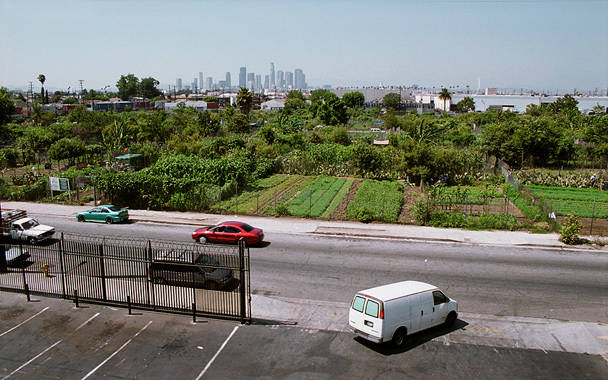It was the headline “Darryl Hannah’s Up a Tree” that first brought attention to the story behind filmmaker Scott Hamilton Kennedy’s Oscar-nominated documentary, The Garden. But the action of the environmentalist movie star—who protested the bulldozing of a 14-acre community garden in one of the most impoverished neighborhoods in L.A. by camping for three weeks in the upper branches of a walnut tree—was just the tabloid-ready short version of the saga. For more than ten years, South Central residents, many of them immigrants and most too poor to own land, helped feed their families by growing an astonishing variety of organic vegetables, fruits, and herbs in lovingly tended plots. The trouble began when the city upheld the claims to the vacant lot by a developer, Ralph Horowitz, who decided that the site would be better used for a warehouse than the country’s largest urban farm.
There’s a low-budget, homegrown quality to The Garden, which Kennedy began filming in 2002. But it’s all there. In 80 compact minutes, he manages to cover the history of the garden’s creation after the 1992 riots, the scheming local activists, the duplicity of local politicians, (among them Los Angeles mayor Antonio Villaraigosa who was unwilling to intervene in the dispute), and the divisions among the farmers themselves after the garden was threatened.
I used to visit the lush field on the corner of 41st and Alameda repeatedly, always marveling at each farmer’s clever use of limited space, the ingenious planting methods, and the happy vibe that hung over the place. But you don’t need firsthand experience to be enraged and saddened at how The Garden ends: In June 2006, police showed up in riot gear, evicted the farmers, brought in heavy tractors, and flattened an almost majestic patch of green abundance in a community otherwise dominated by factories and railroad tracks. Since then, some of the farmers have re-planted their crops at a nearby lot beneath power lines, while others transformed 80 donated acres in Bakersfield (about a 90-minute drive from L.A.) into a money-making produce business. “Politicians are supposed to help the people they serve—the poorest and the wealthiest—as best they can,” Kennedy told me. To this day, he has two words to describe the failure to save the South Central garden: “Absolutely heartbreaking.”

